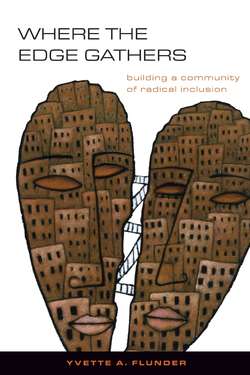Читать книгу Where the Edge Gathers: - Yvette A. Flunder - Страница 18
На сайте Литреса книга снята с продажи.
THE ROLE OF THE CHURCH
ОглавлениеIt is a blessing to see the church in its role as a harbinger of justice in the presence of an unjust society. However, on the issue of same-sex unions, we must deal with the policies that structure society and the church, which influence the definition of moral correctness. This is particularly true because the majority population of both is heterosexual, fearful of the “other,” and threatened by a possible negative economic impact resulting from equal rights for same-sex couples. Reinhold Neibuhr asserts in Moral Man and Immoral Society that the larger society, when functioning as society, is not moved by love to respond justly. Individuals who are challenged on a one-to-one basis by real and familiar people are more apt to do the right thing.14 Neibuhr claims that our social life reveals the limit of our sympathy. Hiding in the larger society does make us less personally responsible. Consequently, when the issue of same-sex unions is considered in small close circles, acceptance and affirmation come more easily. For example, I believe that many clergy and politicians would support SGL unions if they were engaged in an intimate conversation with friends; but in the nation and church our social ego, politics, and fear do overwhelm our compassion and discernment. Whatever is the way of the majority becomes the master narrative; everything else is a “lifestyle” and deemed to be of lesser value.
Additionally, it is the desire for power in our society that often votes in the secret of the voting booth—each person seeking what will benefit him/her most and give him/her the most power and privilege. The fact that propositions 187 and 209 passed in California is evidence of this.15 The economic implications of same-sex unions alone, for example, lower income taxes collected and greater strain on the social security budget, will probably delay the majority of Americans from voting to make same-sex unions legal.
The church, however, has a higher obligation to treat this as a justice issue. The church is to be the reflection of God, and has historically used its unique position in society to effect change in social justice issues. These issues have included abolishing slavery, securing the right to vote for women, promoting civil rights for former slaves, and ending apartheid in South Africa. This is a justice issue. Carolyn Lochhead writes
(Heterosexual) Marriage, many gay leaders now insist, is the most obvious and profound form of state discrimination against gays and lesbians. An entire body of law hinges on the marriage contract, they argue, and with it an entire body of rights that constitute the essence of legal bias against homosexuals—from property rights to hospital-visitation privileges—as well as a deeply felt social validation.16
The church must, as Niebuhr encourages, meet power with power by speaking up and decrying the irrational policies that are being promoted to allegedly “protect” the institution of marriage. In The Good Society, Bellah et al. answer the question, “How does the Church help to right institutional wrongs?”17 We can fulfill and build on Martin Luther King Jr.’s notion of the beloved community where “our loyalties transcend our race, our tribe, our class and our nation and people are not judged by the color of their skin [or their affectional orientation], but by the content of their character.”18 The answers given by Bellah apply to the unique role of the church in society and how that role can help to bring justice to the present political climate surrounding same sex unions:
The church’s loyalty to God is above patriotism and that loyalty is what has lifted blind spots from the eyes of the church in the past. The real question should not be, “What does the majority want?” but rather, “Is there a word from God?”
The church forces individuals into a larger unit. The church brings individuals and individual thought into community. This creates the possibility of meaningful dialogue, collective prayer, and greater access to sharing available information.
The church is a principal bearer of education. The African American church, along with many other faith communities, has been a venue for education and information for hundreds of years. This education and information is not limited to religion, but includes health issues, politics, and community life. The church is a primary vein to the heart of the community.
The church teaches the Bible. Biblical religion raises questions of morality. Here is the crux of the matter for the church. What does the Bible say about same-sex unions? The answer is: absolutely nothing. There are texts that refer to homoeroticism and genital expression in idol worship, but even a tortured anti-SGL interpretation of these texts cannot be our principal source to determine the right or wrong of same-sex unions. More importantly, the Bible does speak clearly to the larger issues of how to treat our neighbor, the nature of commitment/covenant, and the character of the Christian community.19
There are many other sources that confirm the viability of same-sex unions—experienced couples, other cultures and traditions (for example, First Nations’ two-spirit people). More and more books are being written that build and support these unions.
The church of Jesus Christ has a responsibility to take the lead in providing a safe home for its SGL children and to advocate for changes in the national referendum.
